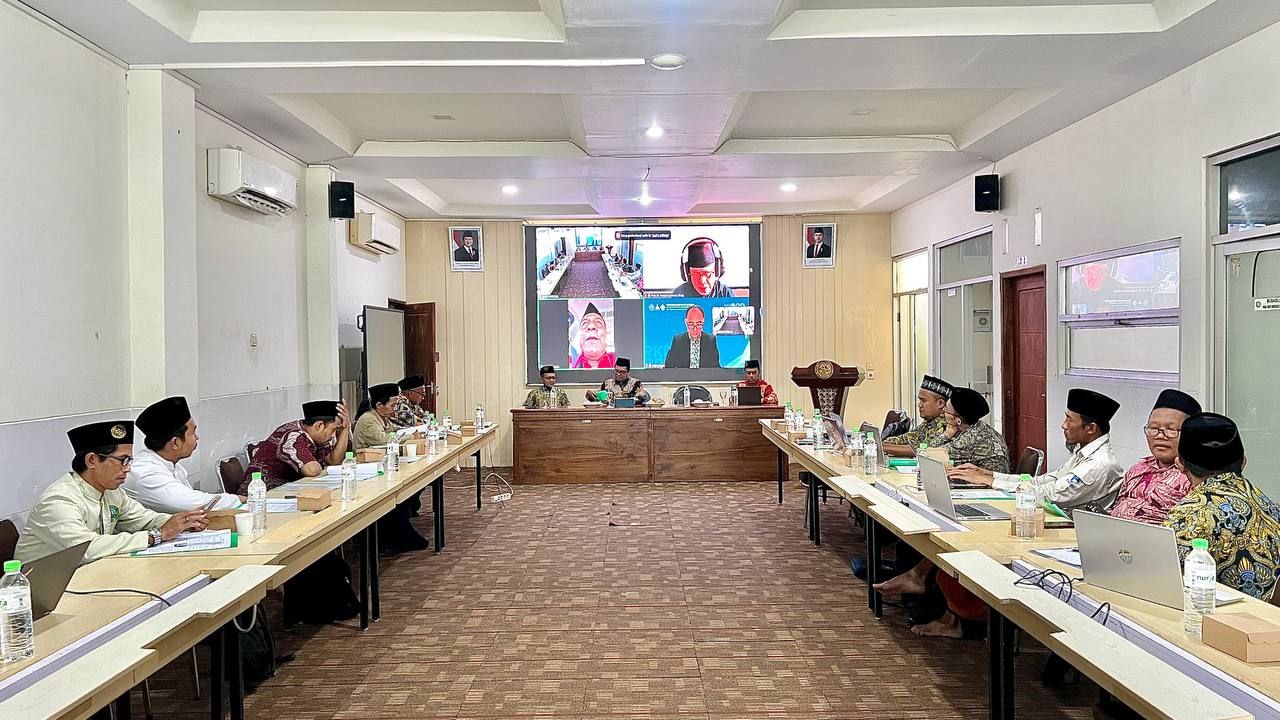Postgraduate Program of UNUJA Holds Curriculum Workshop for Master’s and Doctoral Programs in Islamic Studies to Strengthen Academic Distinction
Saturday, 23 August 2025
Accessed: 371 time

Paiton – The Postgraduate Program of Universitas Nurul Jadid (UNUJA) continues to demonstrate its strong commitment to enhancing academic quality by organizing a Curriculum Workshop for the Master’s (S2) and Doctoral (S3) Programs in Islamic Studies on Saturday, August 23, 2025. The event, held at the UNUJA Lecturer Guesthouse, was conducted in a hybrid format, enabling participants to join either in person or online. The presence of scholars from various regions enriched the discussions, making them more dynamic and insightful.
This workshop served as a crucial momentum for UNUJA’s Postgraduate Program in designing a curriculum that is both visionary and aligned with contemporary needs. In his opening remarks, UNUJA Vice Rector I, M. Noer Fadli Hidayat, M.Kom., emphasized the importance of developing curricula that are oriented toward clear and relevant learning outcomes. “A curriculum should not merely be a formal document, but it must provide tangible benefits, address societal needs, and possess global competitiveness. Through this, UNUJA’s postgraduate graduates can play a significant role in advancing civilization,” he asserted enthusiastically.
On the same occasion, Prof. Dr. Rusydi Sulaiman, M.Ag., as the workshop reviewer, expressed high appreciation for UNUJA’s achievement in establishing the Doctoral Program in Islamic Studies. He regarded its establishment as a remarkable milestone and concrete evidence of UNUJA’s seriousness in advancing Islamic scholarship. “Our hope is that this workshop will produce a curriculum with a distinct academic character, enabling UNUJA’s postgraduate graduates to not only contribute to local communities but also play a significant role at the national and international levels,” he stressed.
Further constructive input was provided by Prof. Dr. H. Babun Suharto, S.E., M.M., who highlighted the importance of balancing outcome-oriented curricula with the welfare of faculty members. “Ensuring the well-being of lecturers in both the Master’s and Doctoral programs is vital. When lecturers are well-supported, they are more motivated and focused on advancing their academic capacity, particularly in the field of Islamic Studies. Ultimately, this will significantly enhance the quality of UNUJA’s postgraduate graduates,” he explained.
The workshop was attended by 25 doctoral-level participants with expertise aligned to various concentrations within Islamic Studies. Their presence was not limited to passive participation but also as active contributors who enriched the academic dialogue. The diverse proposals, critiques, and ideas presented during the sessions were all directed toward ensuring that the curriculum would be practical, socially responsive, and firmly rooted in the values of Islamic scholarship.
The workshop proceeded with seriousness and high enthusiasm, reflecting the strong commitment of UNUJA’s academic community to strengthening the sustainability of its postgraduate programs. Each concentration within Islamic Studies was examined comprehensively to ensure a clear, consistent, and community-oriented direction of development.
With the successful implementation of this workshop, the Postgraduate Program of UNUJA is increasingly optimistic about producing graduates who are excellent, competitive, and capable of making meaningful contributions to the advancement of Islamic knowledge. Moreover, this achievement reinforces UNUJA’s position as a pesantren-based university that not only preserves classical traditions of scholarship but also innovates to respond to global challenges.
Related News

Jl. PP Nurul Jadid, Dusun Tj. Lor, Karanganyar, Kab. Paiton, Probolinggo Regency, East Java 67291
+628883077077pasca@unuja.ac.id
